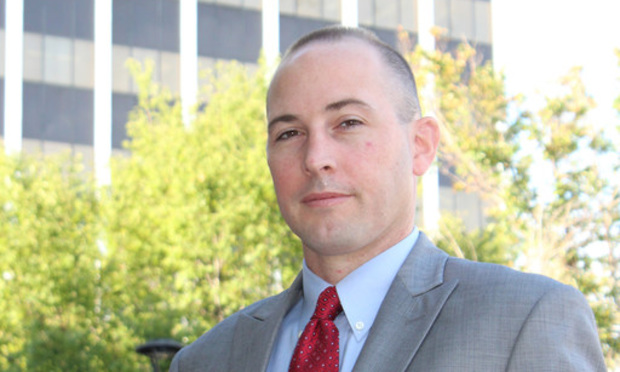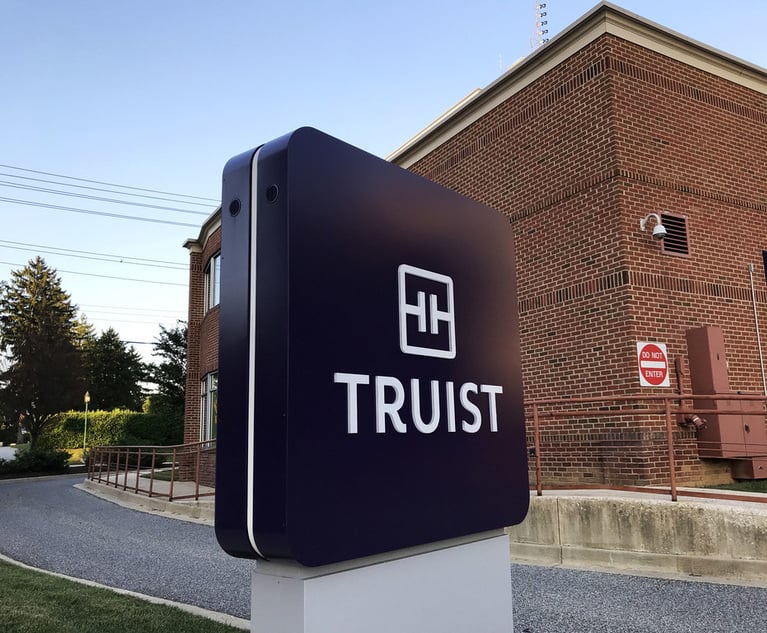Justices: Insurers Not 'Financial Institutions' When Employees Garnished
Answering a federal judge's certified question, the Georgia Supreme Court ruled that garnishments against a former Aflac executive do not have to be filed on special forms required for financial institutions under a 2016 rewrite of Georgia's garnishment statute.
February 05, 2018 at 04:58 PM
5 minute read

Ruling in a case of first impression, the Georgia Supreme Court has declared that an insurance company named in a garnishment action does not qualify as a “financial institution” when it is being garnished for earnings owed to a current or former employee.
The distinction means a man seeking to garnish a former Aflac executive's pension payments does not have to use forms created under a 2016 rewrite of Georgia's garnishment statute that limit the length of time a financial institution can be garnished to five days, rather the 29 days available under a general garnishment.
The justices issued the unanimous ruling at the request of a federal judge in Columbus overseeing a tussle between a man trying to collect a nearly $160,000 judgment against former Aflac executive Sal Diaz-Verson.
After plaintiff Harold Blach filed a garnishment action in 2012 targeting retirement funds paid to Diaz-Verson, Judge Clay Land of the U.S. District Court for the Middle District of Georgia ruled that 25 percent of the bimonthly payments were subject to garnishment.
But then, Diaz-Verson's former lawyer entered the dispute as a third-party claimant, arguing Diaz-Verson owes him nearly $300,000 in unpaid legal fees.
Last year, Land ruled Diaz-Verson's former lawyer, Robert Frey, had a superior claim and that any proceeds from Blach's garnishment must go to Frey until he was paid off. Aflac had deposited more than $140,000 into the court registry at the time.
The case took another turn last year when Diaz-Verson's attorney, Hunton & Williams partner Kurt Powell, said Blach was using the wrong garnishment forms and that most of the money must be returned.
The new law was enacted after the late U.S. District Judge Marvin Shoob ruled the old one unconstitutional because it failed to give debtors proper notice of exemptions or provide a prompt means for addressing exemption claims.
Among other changes, the law cut the garnishment period against a financial institution from up to 45 days to just five, and it mandated new forms be used when filing such garnishments.
The garnishment period for nonfinancial institutions was shortened to 29 days.
Powell filed a motion arguing that any garnishments filed after the new statute took effect in May 2016 were improper because they were filed on forms used for nonfinancial institutions and that any collected funds from that point on must be returned to Diaz-Verson.
The new law has an extensive list of “financial institutions” such as savings banks, savings and loans companies, trust companies, insurance companies “or other organizations held out to the public as a place of deposit of funds or medium of savings or collective investment.”
Blach's attorney, A. Binford Minter of Sandy Springs' Wagner, Johnston & Rosenthal, argued that law was meant to safeguard depositors' funds and did not mean a garnishment filed against an employee of a bank or insurance company would require the use of the special forms.
In his certified question to the state Supreme Court, Land seemed to agree with Diaz-Verson that such an interpretation would mean anyone attempting to garnish a financial institution's employee or retiree would have to file a new garnishment action every five days and use the appropriate forms.
The law “clearly states that insurance companies are financial institutions for purposes of the statute,” Land wrote. Nonetheless, he said, “an argument can be made that this court's plain meaning interpretation cannot be what the General Assembly intended.”
The high court heard arguments in August, and Monday's opinion came down squarely on Blach's side.
Writing for the court, Justice Michael Boggs conceded the statute's language explicitly included insurance companies, he also said that it should be viewed within the context of the entire code section it occupies.
The financial institution form includes language requiring the garnishment defendant's “account, identification, or tracking number,” and includes a subsection for those a defendant who “does not have an active account with” or any money or property held by the garnishee.
The forms “demonstrate that 'financial institution,' for purposes of garnishment … is intended to include only those entities that hold funds of the defendant in some type of account.”
If Diaz-Verson's position were to prevail, Boggs wrote, an insurance company, bank or other such institution “could never be the garnishee of a general garnishment, continuing garnishment or continuing garnishment for support as the employer or former employee of the defendant.”
Minter welcomed the ruling.
“Obviously my client is pleased with the court's unanimous decision in his favor,” said Minter via email. “It removes yet another obstacle to collection of his six-year-old judgment.”
Minter said the case was his first appearance at the high court.
Powell did not immediately respond to requests for comment.
This content has been archived. It is available through our partners, LexisNexis® and Bloomberg Law.
To view this content, please continue to their sites.
Not a Lexis Subscriber?
Subscribe Now
Not a Bloomberg Law Subscriber?
Subscribe Now
NOT FOR REPRINT
© 2025 ALM Global, LLC, All Rights Reserved. Request academic re-use from www.copyright.com. All other uses, submit a request to [email protected]. For more information visit Asset & Logo Licensing.
You Might Like
View All
After 2024's Regulatory Tsunami, Financial Services Firms Hope Storm Clouds Break

Milberg Files Data Breach Suits Against North Carolina-Based Truist Bank

Wells Fargo Litigation Over 'Reverse Redlining' in Mortgage Lending Practices Moves Federal Courts
3 minute read
Federal Judge Enters Default Judgment in Favor of Law Firm, Hospital Scammed Out of $100K
Trending Stories
Who Got The Work
J. Brugh Lower of Gibbons has entered an appearance for industrial equipment supplier Devco Corporation in a pending trademark infringement lawsuit. The suit, accusing the defendant of selling knock-off Graco products, was filed Dec. 18 in New Jersey District Court by Rivkin Radler on behalf of Graco Inc. and Graco Minnesota. The case, assigned to U.S. District Judge Zahid N. Quraishi, is 3:24-cv-11294, Graco Inc. et al v. Devco Corporation.
Who Got The Work
Rebecca Maller-Stein and Kent A. Yalowitz of Arnold & Porter Kaye Scholer have entered their appearances for Hanaco Venture Capital and its executives, Lior Prosor and David Frankel, in a pending securities lawsuit. The action, filed on Dec. 24 in New York Southern District Court by Zell, Aron & Co. on behalf of Goldeneye Advisors, accuses the defendants of negligently and fraudulently managing the plaintiff's $1 million investment. The case, assigned to U.S. District Judge Vernon S. Broderick, is 1:24-cv-09918, Goldeneye Advisors, LLC v. Hanaco Venture Capital, Ltd. et al.
Who Got The Work
Attorneys from A&O Shearman has stepped in as defense counsel for Toronto-Dominion Bank and other defendants in a pending securities class action. The suit, filed Dec. 11 in New York Southern District Court by Bleichmar Fonti & Auld, accuses the defendants of concealing the bank's 'pervasive' deficiencies in regards to its compliance with the Bank Secrecy Act and the quality of its anti-money laundering controls. The case, assigned to U.S. District Judge Arun Subramanian, is 1:24-cv-09445, Gonzalez v. The Toronto-Dominion Bank et al.
Who Got The Work
Crown Castle International, a Pennsylvania company providing shared communications infrastructure, has turned to Luke D. Wolf of Gordon Rees Scully Mansukhani to fend off a pending breach-of-contract lawsuit. The court action, filed Nov. 25 in Michigan Eastern District Court by Hooper Hathaway PC on behalf of The Town Residences LLC, accuses Crown Castle of failing to transfer approximately $30,000 in utility payments from T-Mobile in breach of a roof-top lease and assignment agreement. The case, assigned to U.S. District Judge Susan K. Declercq, is 2:24-cv-13131, The Town Residences LLC v. T-Mobile US, Inc. et al.
Who Got The Work
Wilfred P. Coronato and Daniel M. Schwartz of McCarter & English have stepped in as defense counsel to Electrolux Home Products Inc. in a pending product liability lawsuit. The court action, filed Nov. 26 in New York Eastern District Court by Poulos Lopiccolo PC and Nagel Rice LLP on behalf of David Stern, alleges that the defendant's refrigerators’ drawers and shelving repeatedly break and fall apart within months after purchase. The case, assigned to U.S. District Judge Joan M. Azrack, is 2:24-cv-08204, Stern v. Electrolux Home Products, Inc.
Featured Firms
Law Offices of Gary Martin Hays & Associates, P.C.
(470) 294-1674
Law Offices of Mark E. Salomone
(857) 444-6468
Smith & Hassler
(713) 739-1250






